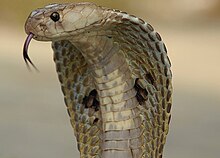naja
Jump to navigation
Jump to search
English
[edit]
Etymology 1
[edit]From Sanskrit नाग (nāga), from Proto-Indo-European *(s)neg- (“to crawl; a creeping thing”).
Noun
[edit]naja (plural najas)
See also
[edit] Naja on Wikipedia.Wikipedia
Naja on Wikipedia.Wikipedia  Naja on Wikispecies.Wikispecies
Naja on Wikispecies.Wikispecies  Naja on Wikimedia Commons.Wikimedia Commons
Naja on Wikimedia Commons.Wikimedia Commons
Etymology 2
[edit]Noun
[edit]naja (plural najas)
- A necklace or pendant made in the shape of the traditional Navajo symbol of a crescent.
- Synonym: squash blossom necklace
- 1973, Margery Bedinger, Indian Silver: Navajo and Pueblo Jewelers, Albuquerque, N.M.: University of New Mexico Press, →ISBN, page 229:
- Carter has several illustrations of English horse amulets that clearly resemble early Navajo najas.
- 1997, Lauran Paine, The White Bird, Thorndike, M.E.: Thorndike Press; Bath, Somerset: Chivers Press, published 1998, →ISBN, page 134:
- Belle came out of her dark place to show Sam her necklace. It was beautiful. In the center was a naja.
- 2015 May 14, Victoria Gomelsky, “Beauty and Balance in Turquoise”, in The New York Times[1], New York, N.Y.: The New York Times Company, →ISSN, →OCLC, archived from the original on 2021-02-14:
- In Los Angeles, the designers Jacquie Aiche and Irene Neuwirth both said they had been seduced by Native American style. In April, Ms. Aiche debuted a limited collection of leather bolo ties anchored by a crescent-shaped pendant not unlike the traditional Navajo naja symbol, while Ms. Neuwirth showed a long rainbow-colored strand of gemstones whose silhouette recalls a luxe version of the naja, or squash blossom necklace.
Anagrams
[edit]Dutch
[edit]Interjection
[edit]naja
- Contraction of nou ja.
French
[edit]Pronunciation
[edit]Noun
[edit]naja m (plural najas)
- cobra (venomous snake)
Further reading
[edit]- “naja”, in Trésor de la langue française informatisé [Digitized Treasury of the French Language], 2012.
German
[edit]Alternative forms
[edit]Etymology
[edit]Pronunciation
[edit]Interjection
[edit]naja
- well
- uh-huh, if you say so (expresses disagreement with what was said but an unwillingness to argue about it)
- —Ich finde, Justin Bieber ist der größte kanadische Musiker seit Neil Young!
—Naja.- —I think Justin Bieber’s the greatest Canadian musician since Neil Young!
—Uh-huh.
- —I think Justin Bieber’s the greatest Canadian musician since Neil Young!
Further reading
[edit]Greenlandic
[edit]Pronunciation
[edit]Noun
[edit]naja (plural najat)
- Alternative form of najak
Italian
[edit]Noun
[edit]naja f (uncountable)
- Alternative form of naia (“compulsory military conscription”)
Pipil
[edit]Etymology
[edit]From Proto-Nahuan *nəh. Compare Classical Nahuatl nehhuātl (“I”).
Pronunciation
[edit]Pronoun
[edit]naja
- (personal) I, first person singular pronoun.
- Naja nimayana.
- I’m hungry.
See also
[edit]Pipil personal pronouns
Portuguese
[edit]Etymology
[edit]From Sanskrit नाग (nāgá, “serpent, snake”).
Pronunciation
[edit]
Noun
[edit]naja f (plural najas)
- a member of the Naja genus of venomous snakes; cobra
- Synonyms: cobra-de-capelo, cobra-capelo
Spanish
[edit]Etymology
[edit]From Sanskrit नाग (nāgá, “serpent, snake”).
Noun
[edit]naja f (plural najas)
Further reading
[edit]- “naja”, in Diccionario de la lengua española, Vigésima tercera edición, Real Academia Española, 2014
Venetian
[edit]Etymology
[edit]Noun
[edit]naja f (invariable)
Categories:
- English terms derived from Sanskrit
- English terms derived from Proto-Indo-European
- English lemmas
- English nouns
- English countable nouns
- English terms borrowed from Navajo
- English terms derived from Navajo
- English terms with quotations
- en:Elapid snakes
- Dutch lemmas
- Dutch interjections
- Dutch contractions
- French 2-syllable words
- French terms with IPA pronunciation
- French terms with audio links
- French lemmas
- French nouns
- French countable nouns
- French masculine nouns
- German compound terms
- German 2-syllable words
- German terms with IPA pronunciation
- German terms with audio links
- German lemmas
- German interjections
- German terms with usage examples
- Greenlandic terms with IPA pronunciation
- Greenlandic lemmas
- Greenlandic nouns
- kl:Family
- kl:Female
- Italian lemmas
- Italian nouns
- Italian uncountable nouns
- Italian terms spelled with J
- Italian feminine nouns
- Pipil terms inherited from Proto-Nahuan
- Pipil terms derived from Proto-Nahuan
- Pipil terms with IPA pronunciation
- Pipil lemmas
- Pipil pronouns
- Pipil terms with usage examples
- Portuguese terms derived from Sanskrit
- Portuguese 2-syllable words
- Portuguese terms with IPA pronunciation
- Portuguese lemmas
- Portuguese nouns
- Portuguese countable nouns
- Portuguese feminine nouns
- pt:Snakes
- Spanish terms derived from Sanskrit
- Spanish lemmas
- Spanish nouns
- Spanish countable nouns
- Spanish feminine nouns
- es:Snakes
- Venetian lemmas
- Venetian nouns
- Venetian feminine nouns
